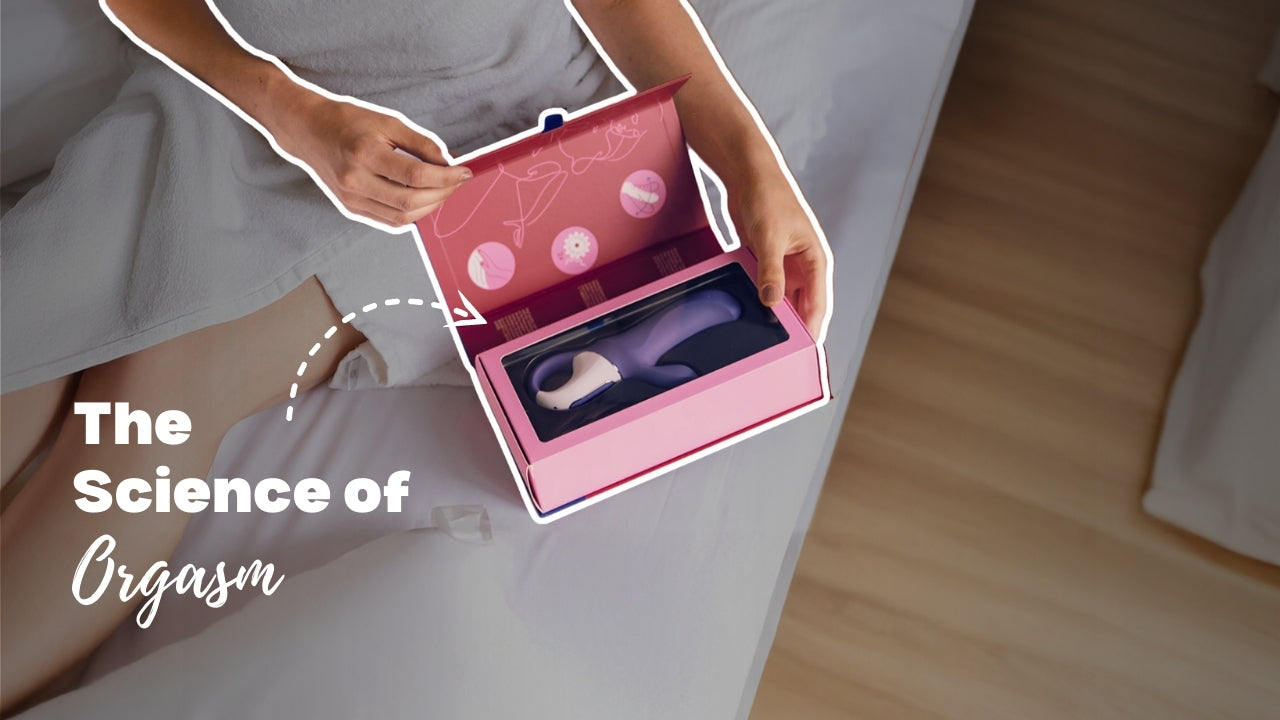So, let's talk about something that should get all the spotlight and yet still feels like some kind of secret club: orgasms. They are intense, electrifying, and sometimes mysterious. But, here's the thing-there is actual science to that toe-curling moment, and it is way cooler than you think.
In this blog, we will get right into the nitty-gritty of orgasms: what they are, how they work, and what is happening in your body when it reaches that peak of pleasure. Hopefully, by the end of this, you'll not only know the magic behind the science but feel a little like a sexual wellness superstar, too. Grab your drink of choice, and let's dive in!
What Exactly Is an Orgasm?
At its core, an orgasm is your body saying, "Wow, that feels amazing!" It's a mix of muscle contractions, nerve stimulation, and a flood of feel-good chemicals all working together in harmony. Think of it as a symphony where your brain, body, and emotions play the lead roles.
Scientifically, an orgasm is a physiological response to arousal. But it's also deeply psychological: a product of your thoughts, feelings, and fantasies. That's why no two orgasms feel quite the same-they're unique because you are.
What Happens During an Orgasm?
An orgasm might only last a few seconds, but behind the scenes, your body is working overtime to create that rush of pleasure. Here’s a play-by-play of what’s happening:
1. Your Brain Takes ChargeYour brain is the MVP of orgasms. When you’re aroused, it releases a cocktail of chemicals like dopamine (the “feel-good” hormone), oxytocin (the “bonding” hormone), and endorphins (nature’s painkillers). These chemicals flood your system, creating that euphoric, out-of-this-world feeling.
2. Blood Flow = SensationYour genitals swell from the blood rush, leading to heightened sensitivity in this area. Every touch, stroke, or vibration may become extra intense during arousal.
- In vulva owners, arousal results in engorgement of the clitoris and vaginal walls.
- In penis owners, it involves filling of erectile tissues with blood within the penis.
It's how your body is gearing up for the main event.
3. Muscles Join the PartyAs you approach orgasm, your pelvic floor muscles begin to contract rhythmically. These contractions are what create those intense, pulsing sensations. Fun fact: your orgasms involve muscles you never even knew you had!
4. Nerve Endings Light UpYour body's nerve endings are firing on all cylinders during an orgasm. The clitoris contains more than 8,000 nerve endings, so it is little wonder that orgasms can feel like blowing one's mind. The same goes for the penis, which also has thousands of highly sensitive nerve endings working overtime.
The Four Stages of an Orgasm
Sexual response doesn’t happen all at once—it’s a journey with four distinct stages, as described by sex researchers Masters and Johnson. Let’s break it down:
1. ExcitementThis is the “I’m into this” stage. Blood starts flowing, your heart rate increases, and your body gets ready for action. Think of it as a warm-up—things are just getting started.
2. PlateauHere's where the tension mounts. Your breathing starts to hasten and your muscles tense up, your body getting ready for the climax. It is like that moment of being on a rollercoaster right before the big drop.
3. OrgasmBoom. This is the peak-those rhythmic muscle contractions, that rush of chemicals, and that overwhelming wave of pleasure. Time seems to stand still while your body releases all that built-up tension.
4. ResolutionAfter the orgasm, your body returns to normal. Blood flow lessens, your heart rate slows down, and you may feel very relaxed. Hello, afterglow!
Why Orgasms Feel So Good
Here's the thing: orgasms aren't just about physical sensations, they're also about the brain. When you climax, your brain releases a cascade of chemicals that make you happy, relaxed, and connected-it's as if your body is clapping you on the back and saying, "Good job, kiddo.”
Here are the stars of the show:
- Dopamine-serotonin: Makes you feel great, cranking up the pleasure.
- Oxytocin: Strengthens emotional bonds-a reason why orgasms can feel so intimate.
- Endorphins: They reduce stress and leave you with that blissed-out feeling.
The Orgasm Gap: Let’s Talk About It
Not everyone experiences orgasm in the same way-or at all, for that matter. As a matter of fact, studies show that people with penises tend to orgasm more easily than those with vulvas. This is called the orgasm gap, and it's a real thing.
Why does it happen? Part of it comes down to anatomy-like the clitoris being misunderstood or overlooked-but it's also about education, communication, and understanding what works for your body. The takeaway is that everyone deserves pleasure, and taking the time to explore your body is the first step toward closing the gap.
How to Enhance Your Orgasms
Ready to level up your orgasm game? Here are some tips to help you get the most out of your body’s natural pleasure potential:
- Focus on Foreplay: Don’t rush—take the time to explore what feels good. Foreplay isn’t just fun; it also increases arousal and makes orgasms more intense.
- Try different stimulation: Experiment with clitoral, G-spot, or prostate stimulation to find what works for you.
- Use Lube: A good lubricant can enhance sensations and make everything feel smoother.
- Incorporate Toys: Vibrators, wands, and other toys add new dimensions to your pleasure.
- Try Orgasm Gels: These little bottles of magic are designed to amp up the sensations. With formulas that tingle, warm, or even cool, they increase sensitivity in all the right places, making your orgasms feel even more intense.
- Let Go and Relax: The orgasm is as much a mental thing as it is a physical one. Create an environment that is safe, comfortable, and allows for relaxation.
Why Orgasms Matter
Orgasms aren’t just fun—they’re also good for you. Here are some of the benefits:
- Stress Relief: Accomplishment of endorphins may help in comforting and soothing you.
- Better Sleep: Orgasms can make it easier to fall asleep.
- Improved Mood: That post-orgasm glow is no joke; it's a natural mood booster.
- Bonding: Oxytocin, which releases with orgasm during partnered sex, contributes to emotional bonding.
How to Enhance Your Orgasms (With a Little Help from Science)
Let’s talk tools of the trade—because while exploring your body is amazing, sometimes a little extra support can take your pleasure to the next level. That’s where innovations like The Lioness 2.0 Smart AI Vibrator come in.
Imagine a vibrator that not only feels incredible but also gives you insight into your own pleasure patterns. The Lioness 2.0 isn’t just a toy—it’s like having a tiny, high-tech research lab in the palm of your hand. With sensors that track your arousal and orgasms, it helps you understand what really works for your body. It syncs with an app to visualize data like muscle contractions and even offers tips to make your experience better over time.
Why is this cool? Well, understanding your body is key to enhancing your pleasure. Seeing how your arousal builds and how your body responds can demystify orgasms, turning them from a lucky surprise into something you can recreate—and even amplify.
Whether you’re curious about what makes your orgasms tick or just want to add an extra layer of fun to your explorations, tools like these can bridge the gap between knowledge and pleasure. After all, when science meets sensuality, everyone wins.
Own Your Pleasure
Understanding the science of orgasms is way more than a fun fact; it's a connection with your body, an empowerment of confidence, and an embracing of your sexuality. Whether you're flying solo or exploring with a partner, remember this: your pleasure is valid, and you deserve every bit of it.
So go ahead, get curious, get playful, and most importantly, get to know what makes you feel amazing. Because when it comes to orgasms, knowledge isn't just power-it's pleasure. Happy exploring!
 Whatsapp
Whatsapp






